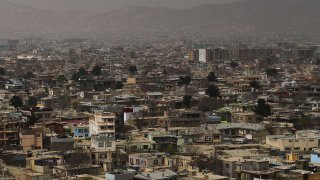
The United States wasted billions of dollars in war-torn Afghanistan on buildings and vehicles that were either abandoned or destroyed, according to a report released Monday by a U.S. government watchdog.
The agency said it reviewed $7.8 billion spent since 2008 on buildings and vehicles. Only $343.2 million worth of buildings and vehicles “were maintained in good condition,” said the Special Inspector General for Afghanistan Reconstruction, or SIGAR, which oversees American taxpayer money spent on the protracted conflict.
The report said that just $1.2 billion of the $7.8 billion went to pay for buildings and vehicles that were used as intended.
“The fact that so many capital assets wound up not used, deteriorated or abandoned should have been a major cause of concern for the agencies financing these projects," John F. Sopko, the special inspector general, said in his report.
Get Tri-state area news delivered to your inbox.> Sign up for NBC New York's News Headlines newsletter.
The U.S. public is weary of the nearly 20-year-old war and President Joe Biden is reviewing a peace deal his predecessor, Donald Trump, signed with the Taliban a year ago. He must decide whether to withdraw all troops by May 1, as promised in the deal, or stay and possibly prolong the war. Officials say no decision has been made.
Meanwhile, Taliban insurgents and the Afghan government have been holding on-again-off-again talks in the Gulf Arab state of Qatar but a deal that could bring peace to Afghanistan after 40 years of relentless war seems far off.
Analyst Bill Roggio of the Long War Journal said the findings by SIGAR are not surprising. The reasons for the financial losses include Taliban attacks, corruption and “throwing money at the problem without considering the implications,” he said.
U.S. & World
“It is one thing to build a clinic and school, it is another to operate, maintain, and in many cases defend this infrastructure from Taliban attacks,” said Roggio. "Additionally, the West has wildly underestimated the impact of Afghan corruption and in many cases incompetence. It was always a recipe for failure.”
U.S. agencies responsible for construction didn't even ask the Afghans if they wanted or needed the buildings they ordered built, or if they had the technical ability to keep them running, Sopko said in his report.
The waste occurred in violation of “multiple laws stating that U.S. agencies should not construct or procure capital assets until they can show that the benefiting country has the financial and technical resources and capability to use and maintain those assets effectively,” he said.
Torek Farhadi, a former adviser to the Afghan government, said a "donor-knows-best” mentality often prevailed and it routinely meant little to no consultation with the Afghan government on projects.
He said a lack of coordination among the many international donors aided the wastefulness. For example, he said schools were on occasion built alongside other newly constructed schools financed by other donors. The construction went ahead because once the decision was made — contract awarded and money allocated — the school was built regardless of the need, said Farhadi.
The injection of billions of dollars, largely unmonitored, fueled runaway corruption among both Afghans and international contractors. But experts say that despite the waste, the need for assistance is real, given the Afghan governments heavy dependence on international money.
The worsening security situation in Afghanistan also greatly impeded the monitoring of projects, with shoddy construction going undetected, said Farhadi, the former Afghan government adviser.
“Consult with the locals about their needs and sustainability of the project once the project is complete,” he urged U.S. funding agencies looking to future projects. “Supervise, supervise, supervise project progress and implementation and audit every single layer of expenditure.”
Going forward, Roggio said smaller, more manageable projects should be the order of the day. To build big unmanageable projects that Afghanistan has neither the capacity nor technical expertise for after 40 years of relentless war “feeds into the Taliban narrative that the government is corrupt, incompetent, and incapable of providing for the Afghan people,” he said.



